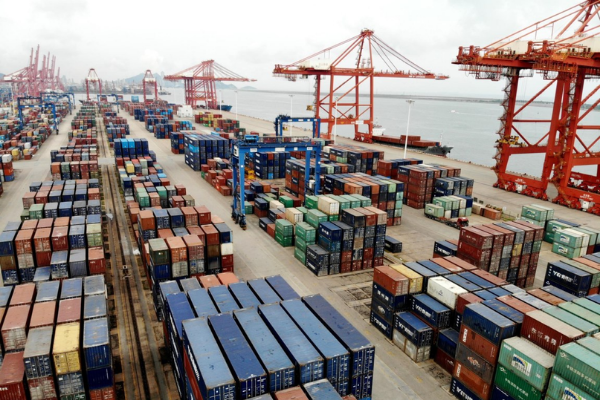One year after Russia’s invasion of Ukraine, and despite international sanctions against Russian businesses, trade between Belgium and Russia has not decreased, even when taking into account the price surge for energy exports, De Morgen reported on Friday.
Statistics for 2022 were published by the Agency for Foreign Trade, showing that last year, Belgian companies exported goods worth €3.6 billion to Russia. In the other direction, imports from Russia reached €12.8 billion.
The value of imported goods from Russia saw a record increase (+64.7%), in line with a sharp increase in gas prices. Excluding the surge in energy prices, imports from Russia remained at an elevated value. While dropping by €500,000 compared to 2021, they are roughly equal to the level of trade during the pandemic in 2020 and equal to those in 2019.
According to similar calculations published by the New York Times in October, monthly average trade volume between Belgium and Russia grew by 81% between the start of Russia’s invasion and the end of October 2022. Similarly, monthly average exports grew by 130%.
In November 2022, the Brussels Times created forecasts for Belgium-Russia trade, based on Observatory for Economic Complexity (OEC) trade statistics and the NYT data, which suggested that Belgium would conclude $14.35 billion in imports from Russia by the end of the last year.
Statistics from the Agency for Foreign Trade show that Belgium only slightly fell short of this prediction at $13.6 billion. For reference, Belgium imported goods worth $13 billion from the United Kingdom during 2020.
Disappointing results
In reaction to The Brussels Times’ forecasts in November, Belgium-based Ukraine NGO Promote Ukraine expressed their disappointment at Belgian businesses. Trade in energy, as well as between Belgian and Russian companies, helps provide tax revenues for the Kremlin, which funds its war in Ukraine.
“We are shocked to see that Belgian trade with Russia has increased since the beginning of the war. But we are not surprised,” said Marta Barandiy, founder of Promote Ukraine. “We are concerned that existing mechanisms for the implementation of sanctions on the national level are not yet efficient and transparent enough.”
Since the start of the war, Promote Ukraine has been pushing Belgian companies to make a clean break with the Russian economy. Several companies are accused of failing to do so and even the Belgian government has been reluctant to break all its ties with the Russian energy sector.
In October, the FPS Economy and FPS Foreign Affairs refused to react to the economic forecasts made by The Brussels Times, and suggested that data from NYT had “misrepresented” the true picture of trade with Russia. In reality, forecasts made by The Brussels Times and NYT were just 5.2% over the real value of imports.
Related News
- 'Devastating consequences': Belgium FM condemns Russian human rights violations at UN
- 'Russia is cut away from the world': Von der Leyen highlights Russia's isolation
While Belgian exports to Russia fell slightly in 2022, three important sectors enjoyed a good year in trade with Russia. Notably, exports related to the biochemical sector, mostly medicines and vaccines, grew by 22% last year.
For imports, Belgium is still a massive importer of Russian uncut diamonds, primarily from Russian oligarch-controlled mining company Alrosa. In January 2023, Belgium imported €132 million worth of Russian rough diamonds, up from €97 million before the start of Russia’s invasion in January 2022.
Belgium has refused to place sanctions on the diamond trade, with Belgian Prime Minister Alexander De Croo previously warning that cracking down in the industry would have “zero” impact on Russia but a “very great” effect on Europe.

